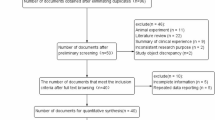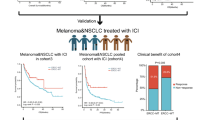Abstract
ERCC1 (excision repair cross complementation group 1) is a subunit of the nucleotide excision repair complex, which can perform DNA strand incision correction of DNA damage. Association studies on the ERCC1 polymorphisms (C8092A and T19007C) in cancer had shown conflicting results. We performed a meta-analysis from all eligible case–control studies to assess the purported associations. Overall, the 19007C allele (3 853 patients and 4 349 controls) showed no significant effect on cancer risk compared to 19007T allele (P=0.39, odds ratio (OR)=0.95; 95% confidence interval (CI) 0.85–1.06, Pheterogeneity=0.001) in all subjects. Meta-analysis under other genetic contrasts did not reveal any significant association of T19007C to cancer in all subjects, Caucasians and Asians. The 19007C allele (2 279 patients and 2 808 controls) showed no significant effect on lung cancer risk compared to 19007T allele (P=0.72, OR=0.94, 95% CI 0.69–1.29, Pheterogeneity=0.0001) in all subjects. No significant effect of 8092A allele (3 865 patients and 3 750 controls) on cancer risk in all subjects (P=0.85, OR=1.01, 95% CI 0.94–1.08, Pheterogeneity=0.92) and in Caucasians and Asians compare to 8092C. No evidences of association of C8092A (501 patients and 620 controls) to squamous cell carcinoma were found. The accumulated evidence indicated ERCC1 T19007C and C8092A might not be risk factors for cancer. Significant between-study heterogeneity existed in T19007C, which arose from a study showing significant protecting effect of 19007C allele compare to 19007T allele in smokers. More studies based on larger, stratified case-control population should be required to further evaluate the role of ERCC1 C8092A and T19007C polymorphisms in different cancer, especially in smokers.
Similar content being viewed by others
Log in or create a free account to read this content
Gain free access to this article, as well as selected content from this journal and more on nature.com
or
References
de Laat WL, Jaspers NG, Hoeijmakers JH : Molecular mechanism of nucleotide excision repair. Genes Dev 1999; 13: 768–785.
Goode EL, Ulrich CM, Potter JD : Polymorphisms in DNA repair genes and associations with cancer risk. Cancer Epidemiol Biomarkers Prev 2002; 11: 1513–1530.
van Duin M, de Wit J, Odijk H et al: Molecular characterization of the human excision repair gene ERCC-1: cDNA cloning and amino acid homology with the yeast DNA repair gene RAD10. Cell 1986; 44: 913–923.
Wilson MD, Ruttan CC, Koop BF, Glickman BW : ERCC1: a comparative genomic perspective. Environ Mol Mutagen 2001; 38: 209–215.
Chen P, Wiencke J, Aldape K et al: Association of an ERCC1 polymorphism with adult-onset glioma. Cancer Epidemiol Biomarkers Prev 2000; 9: 843–847.
Yu JJ, Lee KB, Mu C et al: Comparison of two human ovarian carcinoma cell lines (A2780/CP70 and MCAS) that are equally resistant to platinum, but differ at codon 118 of the ERCC1 gene. Int J Oncol 2000; 16: 555–560.
Woolf B : On estimating the relation between blood group and disease. Ann Hum Genet 1955; 19: 251–253.
Lau J, Ioannidis JP, Schmid CH : Quantitative synthesis in systematic reviews. Ann Intern Med 1997; 127: 820–826.
Petitti D : Meta-analysis, Decision Analysis, and Cost-effectiveness Analysis. New York: Oxford University Press, 1994.
Egger M, Davey Smith G, Schneider M, Minder C : Bias in meta-analysis detected by a simple, graphical test. BMJ 1997; 315: 629–634.
Zhou W, Liu G, Park S et al: Gene-smoking interaction associations for the ERCC1 polymorphisms in the risk of lung cancer. Cancer Epidemiol Biomarkers Prev 2005; 14: 491–496.
Zienolddiny S, Campa D, Lind H et al: Polymorphisms of DNA repair genes and risk of non-small cell lung cancer. Carcinogenesis 2006; 27: 560–567.
Yin J, Vogel U, Guo L, Ma Y, Wang H : Lack of association between DNA repair gene ERCC1 polymorphism and risk of lung cancer in a Chinese population. Cancer Genet Cytogenet 2006; 164: 66–70.
Hirata H, Hinoda Y, Matsuyama H et al: Polymorphisms of DNA repair genes are associated with renal cell carcinoma. Biochem Biophys Res Commun 2006; 342: 1058–1062.
Skjelbred CF, Saebo M, Nexo BA et al: Effects of polymorphisms in ERCC1, ASE-1 and RAI on the risk of colorectal carcinomas and adenomas: a case–control study. BMC Cancer 2006; 6: 175.
Matullo G, Guarrera S, Sacerdote C et al: Polymorphisms/haplotypes in DNA repair genes and smoking: a bladder cancer case–control study. Cancer Epidemiol Biomarkers Prev 2005; 14: 2569–2578.
Moreno V, Gemignani F, Landi S et al: Polymorphisms in genes of nucleotide and base excision repair: risk and prognosis of colorectal cancer. Clin Cancer Res 2006; 12: 2101–2108.
Weiss JM, Weiss NS, Ulrich CM et al: Interindividual variation in nucleotide excision repair genes and risk of endometrial cancer. Cancer Epidemiol Biomarkers Prev 2005; 14: 2524–2530.
Vogel U, Olsen A, Wallin H et al: Effect of polymorphisms in XPD, RAI, ASE-1 and ERCC1 on the risk of basal cell carcinoma among Caucasians after age 50. Cancer Detect Prev 2005; 29: 209–214.
Matullo G, Dunning AM, Guarrera S et al: DNA repair polymorphisms and cancer risk in non-smokers in a cohort study. Carcinogenesis 2006; 27: 997–1007.
Sturgis EM, Dahlstrom KR, Spitz MR, Wei Q : DNA repair gene ERCC1 and ERCC2/XPD polymorphisms and risk of squamous cell carcinoma of the head and neck. Arch Otolaryngol Head Neck Surg 2002; 128: 1084–1088.
Sugimura T, Kumimoto H, Tohnai I et al: Gene-environment interaction involved in oral carcinogenesis: molecular epidemiological study for metabolic and DNA repair gene polymorphisms. J Oral Pathol Med 2006; 35: 11–18.
Wrensch M, Kelsey KT, Liu M et al: ERCC1 and ERCC2 polymorphisms and adult glioma. Neuro-oncol 2005; 7: 495–507.
Yang M, Kim WH, Choi Y et al: Effects of ERCC1 expression in peripheral blood on the risk of head and neck cancer. Eur J Cancer Prev 2006; 15: 269–273.
Wei Q, Frazier ML, Levin B : DNA repair: a double-edged sword. J Natl Cancer Inst 2000; 92: 440–441.
Fox M, Roberts JJ : Drug resistance and DNA repair. Cancer Metastasis Rev 1987; 6: 261–281.
Johnson SW, Stevenson JP, O'Dwyer PJ : Cisplatin and Its Analogues. Philadelphia, PA: Lippincott Williams and Wilkins, 2001.
Reed E : Platinum-DNA adduct, nucleotide excision repair and platinum based anti-cancer chemotherapy. Cancer Treat Rev 1998; 24: 331–344.
Zeng-Rong N, Paterson J, Alpert L et al: Elevated DNA repair capacity is associated with intrinsic resistance of lung cancer to chemotherapy. Cancer Res 1995; 55: 4760–4764.
Wei Q, Cheng L, Xie K et al: Direct correlation between DNA repair capacity and metastatic potential of K-1735 murine melanoma cells. J Invest Dermatol 1997; 108: 3–6.
Author information
Authors and Affiliations
Corresponding authors
Rights and permissions
About this article
Cite this article
Li, Y., Gu, S., Wu, Q. et al. No association of ERCC1 C8092A and T19007C polymorphisms to cancer risk: a meta-analysis. Eur J Hum Genet 15, 967–973 (2007). https://doi.org/10.1038/sj.ejhg.5201855
Received:
Revised:
Accepted:
Published:
Issue date:
DOI: https://doi.org/10.1038/sj.ejhg.5201855
Keywords
This article is cited by
-
ERCC1 polymorphisms as prognostic markers in T4 breast cancer patients treated with platinum-based chemotherapy
Journal of Translational Medicine (2014)
-
Pharmacogenetic analysis of adjuvant FOLFOX for Korean patients with colon cancer
Cancer Chemotherapy and Pharmacology (2013)
-
A C118T polymorphism of ERCC1 and response to cisplatin chemotherapy in patients with late-stage non-small cell lung cancer
Journal of Cancer Research and Clinical Oncology (2012)



